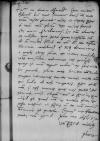Cum mitterem Gdańsk (Danzig, Dantiscum), city in northern Poland, on the Bay of Gdańsk at the mouth of the Vistula, on the Baltic, the biggest and wealthiest of the three Great Prussian Cities (Gdańsk, Thorn (Toruń), and Elbing (Elbląg)) with representation in the Council of Royal Prussia; a member of the Hanseatic League⌊GdanumGdańsk (Danzig, Dantiscum), city in northern Poland, on the Bay of Gdańsk at the mouth of the Vistula, on the Baltic, the biggest and wealthiest of the three Great Prussian Cities (Gdańsk, Thorn (Toruń), and Elbing (Elbląg)) with representation in the Council of Royal Prussia; a member of the Hanseatic League⌋ hunc meum canonicum, commisi illi ante omnia visere sanitatem mentis et corporis Reverendissimae Dominationis Vestrae, quam plurimum rogo missas faciat istas animi perturbationes, haec enim calamitas et monstra, quae parit γυναικοκρατία, sunt illi cum multis summis ac etiam cum tota republica communia. Videbimus, quo tandem deveniemus et quale istorum finis. Ego interim Muses Greek goddesses of literature and the arts⌊MusulisMuses Greek goddesses of literature and the arts⌋ nostris me solor. Admoneo eos exemplis, quorum est nunc regnum aulicorum, ex quibus mitto haec paucula, plura cartae committere non audeo propter itinerarios eventus varios. Mitto etiam, quae habeo de rebus Ungaricis, reverendissimo domino nostro, qui eosdem manes, quos nos patitur, sed contemnit. Misi elegiam Vestrae Dominationi Reverendissimae, in qua nihil est, quod non in medio foro legi posset tutissime, et praesertim cum ea nunc omnium communis est querela.
Commendo me fraternae gratiae Vestrae Reverendissimae Dominationis.


 Bcz, 1595, p. 678
Bcz, 1595, p. 678